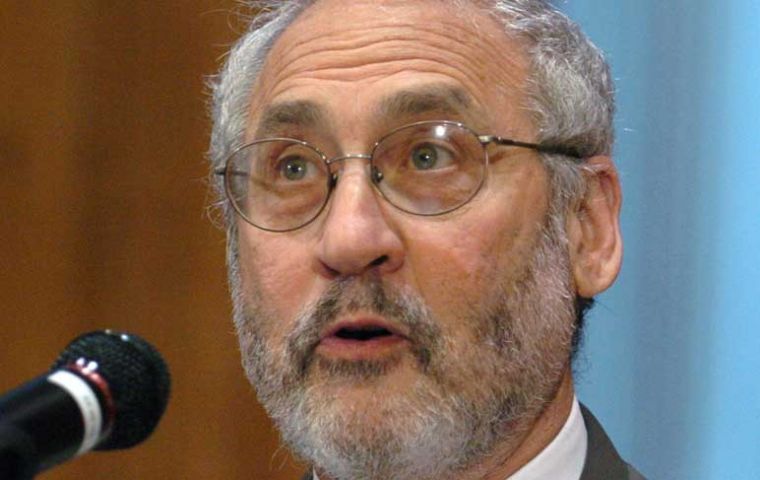MercoPress. South Atlantic News Agency
Nobel laureates warn about risks of a “lost decade”
 Stiglitz. “The current recovery is extremely soft”.
Stiglitz. “The current recovery is extremely soft”. Nobel Economics laureate Edgard Prescott and Joseph Stiglitz warned Monday of a “lost decade” and a worsening of the global financial crisis in the short term during a forum in Sao Paulo, Brazil. The “lost decade” reference is to the stagnation of the economy as happened with Japan during the nineties.
“The future is sombre. We will probably have a lost decade. Even if we overcome the crisis it will be an uneasy period with low growth. We have to be certain about which are the policies to be implemented”, said Stiglitz. “The current recovery is extremely soft”.
“United States will loose a decade of growth, as happened with Japan, following the 1992 crisis. But we are not going to suffer a depression, as in 1929. The fundamentals are quite different”, added Prescott.
The laureates agree that the current situation is the worst experienced by the global economy since the Great Depression of 1929, but opinions differ as to the origin of the turbulence. For Prescott the US economy begun to slacken when the presidential elections and the possible victory of Barack Obama.
“US consumers were ready to buy new cars but industry stopped production as a consequence of the election of Obama”, said Prescott.
However Stiglitz argued that the origin of the crisis is the structure of consumer financing in the US. “The US financial market failed. They were unable to manage risk, to lower costs” and will possibly need an additional injection of funds he anticipated.
Both economists agreed on the need for more regulations of the financial system and the establishment of a new structure of institutions both regarding banks as well as control bodies and international support.
As to where the crisis stands, Sitglitz said it is “the end of the beginning”, and not “the beginning of the end”. “We are at the end of the beginning. We are facing credit contraction and inventories have fallen but remain high. We also must address the fall in home prices, unemployment, and weakness of the financial system. There’s a slow recovery, but much depends on the policies to be implemented”.
Prescott said the US was beginning to reach the bottom. “If I had to mention a number I would say we’re two fifths into the crisis. In the US we are beginning to reach the bottom and recovery will start, but it won’t be vigorous. In Europe I see no end to the fall, maybe towards the end of the year, but we will need other policies. In China stimulus packages seem to be working but now tax cuts and company profits are needed”.
However Prescott said tax cuts must benefit individuals, “we have a demand crisis, which needs to be stimulated, particularly now that the risks of a depression have been overcome. Less tax will help families spend more which is essential to spur corporate investment”.
Another issue which was mentioned by Stiglitz was unemployment in the US currently at 8.9%, but if measured with a more accurate methodology would be “closer to 16%”. “There’s a problem with inventories, which although having gone down recently remain high and are a difficulty to get manufacturing moving again”.




Top Comments
Disclaimer & comment rulesCommenting for this story is now closed.
If you have a Facebook account, become a fan and comment on our Facebook Page!